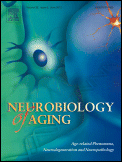
NEUROBIOLOGY OF AGING
Scope & Guideline
Fostering Insight into Aging's Impact on the Nervous System
Introduction
Aims and Scopes
- Neurodegenerative Disease Mechanisms:
Research on the biological and neurological underpinnings of neurodegenerative diseases, particularly Alzheimer’s and Parkinson’s disease, including genetic, molecular, and cellular mechanisms. - Cognitive Aging:
Exploration of the cognitive decline associated with aging, including studies on memory, attention, and executive function across different age groups. - Neuroimaging and Biomarkers:
Utilization of advanced neuroimaging techniques and biomarkers to study brain structure and function in aging populations, focusing on identifying early signs of neurodegeneration. - Role of Lifestyle Factors:
Investigating how lifestyle choices, such as physical activity, diet, and cognitive engagement, influence brain health and cognitive resilience in aging. - Neuroinflammation and Aging:
Study of the role of neuroinflammation in the aging brain and its contribution to cognitive decline and neurodegenerative processes. - Sex and Gender Differences:
Examination of how biological sex and gender differences influence aging processes, neurodegeneration, and cognitive outcomes.
Trending and Emerging
- Multimodal Approaches:
An increasing number of studies are utilizing multimodal research designs, combining neuroimaging, genetic analysis, and cognitive assessments to provide a comprehensive understanding of aging. - Precision Medicine and Genetics:
There is a growing emphasis on genetic risk factors and personalized medicine approaches in understanding Alzheimer's disease and other neurodegenerative conditions. - Impact of Lifestyle on Brain Health:
Research is increasingly focusing on how lifestyle factors, such as diet, exercise, and cognitive engagement, can mitigate cognitive decline and promote brain health. - Neuroinflammation as a Therapeutic Target:
The role of neuroinflammation in aging and neurodegeneration is gaining traction, with studies exploring potential therapeutic interventions to modulate inflammatory processes. - Cognitive Reserve and Resilience:
Emerging interest in cognitive reserve and resilience mechanisms, examining how individuals can maintain cognitive function despite neurobiological changes associated with aging.
Declining or Waning
- Animal Models of Aging:
There appears to be a decline in the number of studies focusing on aging in specific animal models, such as rodents, as researchers increasingly prioritize human studies and translational research. - Pharmacological Interventions:
Research centered on pharmacological treatments for cognitive decline and neurodegenerative diseases has decreased, possibly due to a shift towards lifestyle and non-pharmacological interventions. - Epidemiological Studies:
There is a waning emphasis on large-scale epidemiological studies in favor of more mechanistic and experimental approaches that delve deeper into specific biological processes.
Similar Journals
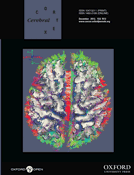
CEREBRAL CORTEX
Elevating the discourse in neuroscience research.CEREBRAL CORTEX, published by Oxford University Press Inc, is a premier journal dedicated to advancing the field of neuroscience, specifically focusing on the cellular, molecular, and cognitive aspects of cortical structure and function. With an impressive impact factor that situates it in the top quartile (Q1) of its categories for 2023, this journal holds significant relevance for researchers and professionals interested in the latest discoveries and methodologies in both Cognitive Neuroscience (ranked #31 out of 115) and Cellular and Molecular Neuroscience (ranked #48 out of 97). Operating without an open access model, it ensures rigorous peer review and dissemination of high-quality research from across the globe. Since its inception in 1991, CEREBRAL CORTEX has established itself as a critical platform for educators and inventors, pushing the boundaries of knowledge in understanding brain function and its implications for behavior. Researchers and students alike will find this journal an invaluable resource for both foundational and cutting-edge studies in neuroscience.
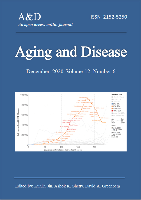
Aging and Disease
Connecting scholars to the future of aging research.Aging and Disease is a leading open-access journal published by the International Society on Aging and Disease, dedicated to advancing the understanding of aging and its associated diseases. Since its inception in 2010, the journal has established itself as a vital resource for researchers and practitioners in the fields of Geriatrics, Neurology, Cell Biology, and Pathology. With an impressive Q1 ranking across multiple categories and a robust position in Scopus rankings, including ranks in the top 3% in Geriatrics and Gerontology, it showcases high-quality research that addresses the complexities of aging processes. Each issue presents original articles, reviews, and insights aimed at improving health outcomes for the aging population. The open-access model ensures that valuable research findings are readily available to a global audience, fostering collaboration and innovation. As a go-to publication for scholars, healthcare professionals, and students, Aging and Disease significantly contributes to the multidisciplinary dialogue surrounding aging and its health implications.

npj Aging and Mechanisms of Disease
Illuminating the Pathways of Aging and Diseasenpj Aging and Mechanisms of Disease is a leading open-access journal dedicated to advancing the understanding of the biological mechanisms underlying aging and age-related diseases. Published by NATURE PORTFOLIO in the United Kingdom, this journal has established itself as a vital resource within the fields of Aging and Geriatrics and Gerontology, proudly holding a prestigious Q1 ranking in both categories as of 2023. With an impressive Scopus ranking, placing it in the top 10 for Geriatrics and Gerontology, and the top 9 for Aging, the journal is committed to disseminating high-quality, peer-reviewed research that offers innovative insights and fosters collaboration among researchers and practitioners. Since its inception in 2015, npj Aging and Mechanisms of Disease has embraced the open-access model, ensuring that groundbreaking findings are freely available to all, thereby promoting widespread knowledge-sharing within the scientific community. This journal serves as an essential platform for those seeking to explore the complex interplay of genetic, molecular, and environmental factors that influence aging and its associated challenges.

npj Aging
Fostering interdisciplinary dialogue on aging.npj Aging, published by Nature Publishing Group, is a pioneering journal dedicated to advancing our understanding of the biological, clinical, and social aspects of aging. With an E-ISSN of 2731-6068, this open-access journal aims to foster innovative research and interdisciplinary dialogue among scientists, clinicians, and policy-makers. As of its inception in 2023, the journal has quickly established itself within the scholarly community, ranking 15th in Medicine (Geriatrics and Gerontology) and 12th in Biochemistry, Genetics, and Molecular Biology focusing on Aging, reflecting a strong percentile standing in both categories. The journal provides a platform for disseminating important findings that address the complexities of aging, ensuring accessibility for a broader audience. Located at the Macmillan Building, 4 Crinan St, London, England, npj Aging aspires to be an essential resource for those seeking to enhance their understanding and contribute to the field of gerontology.

Aging Medicine
Fostering Collaboration in Aging MedicineAging Medicine, published by Wiley, is a pivotal open-access journal that has been at the forefront of research dedicated to the aging population since its inception in 2018. With a focus on both geriatric care and gerontology, the journal serves as a crucial resource for researchers, healthcare professionals, and students interested in understanding the complexities of aging and the related medical challenges. Although it holds a Q3 quartile ranking in the fields of Aging and Geriatrics and Gerontology according to the 2023 metrics, the journal continues to effectively disseminate valuable research and insights, helping to bridge gaps in knowledge and practice. With an E-ISSN of 2475-0360, it offers an open-access model that ensures broader accessibility to its published content, thus promoting collaboration and innovation across disciplines. As the journal converges towards 2024, it remains committed to evolving with the dynamics of aging research, making it a significant platform for the exchange of ideas and advancements in this essential field.
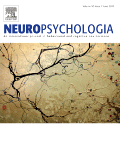
Neuropsychologia
Exploring the Mind: Bridging Psychology and NeuroscienceNeuropsychologia, published by PERGAMON-ELSEVIER SCIENCE LTD, is a premier journal that delves into the intersections of psychology and neuroscience, specifically focusing on behavioral and cognitive processes. Since its inception in 1963, this esteemed journal has been a vital platform for researchers, professionals, and students, showcasing innovative studies and advancements in the fields of Behavioral Neuroscience, Cognitive Neuroscience, and Experimental Psychology. With a commendable impact factor, placing it in the Q2 category across multiple disciplines, Neuropsychologia is recognized for its contribution to the scientific community, ranking among the top journals in both Experimental and Cognitive Psychology and Neuroscience. The journal's commitment to excellence is evident in its rigorous peer-review process and its mission to disseminate cutting-edge research, making it an invaluable resource for those seeking to expand their knowledge and insights in neuropsychology. For further reading, the journal is accessible in both print and digital formats, ensuring that researchers can easily engage with the latest findings and theoretical advancements in this dynamic field.
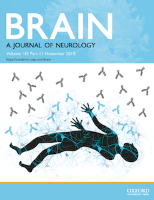
BRAIN
Unraveling the Mysteries of the Brain, One Study at a TimeBRAIN, published by Oxford University Press, stands as a preeminent journal in the realms of neurology and medicine, with a formidable impact factor reflecting its rigorous peer-reviewed standards and significant contributions to the field. With its ISSN 0006-8950 and E-ISSN 1460-2156, this esteemed publication spans over a century of exceptional research, converging from its historical roots in 1878 to current groundbreaking studies. BRAIN boasts a distinguished rank of #8 out of 400 in the Scopus category of Neurology (Clinical), placing it in the 98th percentile of institutions, indicative of its influence and reach. Operating under the Q1 category in both Medicine (Miscellaneous) and Clinical Neurology, the journal is dedicated to fostering interdisciplinary dialogue among researchers, clinicians, and students alike. With a focus on innovative findings and clinical advancements, BRAIN serves as a vital resource for those seeking to deepen their understanding of neurological disorders and the evolving landscape of medical research.
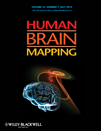
HUMAN BRAIN MAPPING
Mapping the complexities of brain structure and function.HUMAN BRAIN MAPPING, published by Wiley, is a premier journal in the field of neuroscience, devoted to comprehensively advancing understanding of brain structure and function through innovative mapping techniques. With an impressive impact factor and ranked in the Q1 category across multiple relevant disciplines—including Anatomy, Neurology, and Radiology—this journal is recognized as a vital resource for researchers and professionals passionate about the complexities of the human brain. Founded in 1993 and continuously publishing groundbreaking research, HUMAN BRAIN MAPPING is essential for those looking to stay at the forefront of developments in anatomical and neurological research. Though it does not currently offer Open Access options, the journal remains committed to disseminating high-quality research that influences clinical practices and academic inquiry. Its esteemed position within Scopus highlights its significance; charting at the top percentiles across various medical and health fields serves as a testament to the critical contributions made by the authors and researchers involved. As it converges toward 2024, HUMAN BRAIN MAPPING continues to be the go-to platform for publishing pivotal insights into the intricacies of brain mapping methodologies and applications.
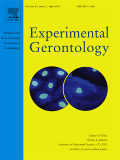
EXPERIMENTAL GERONTOLOGY
Elevating Aging Research to New Heights of ExcellenceEXPERIMENTAL GERONTOLOGY is a prestigious journal published by PERGAMON-ELSEVIER SCIENCE LTD, dedicated to the evolving field of aging research. With a rich history dating back to 1964 and continuing through 2024, this journal aims to advance the understanding of the biological processes underlying aging and develop interdisciplinary approaches to improve healthspan. ENCOMPASSING a broad scope, including *biochemistry*, *cell biology*, *endocrinology*, *genetics*, and *molecular biology*, it holds impressive rankings in the 2023 Scopus Ranks, featuring in Q1 and Q2 quartiles across multiple categories. This positions it as a vital resource for researchers and professionals focused on gerontology and related fields. As a subscription-based journal without open access, EXPERIMENTAL GERONTOLOGY ensures the dissemination of high-quality research through rigorous peer review, making it an essential publication for those aspiring to remain at the forefront of aging studies.

GeroScience
Elevating Knowledge in Aging ScienceGeroScience, published by Springer, is an esteemed open-access journal that focuses on the multidisciplinary field of aging research. Since its inception in 2017, the journal has quickly established itself as a leader in its field, achieving impressive Q1 quartile rankings across various categories, including Aging, Cardiology and Cardiovascular Medicine, Geriatrics and Gerontology, and Complementary and Alternative Medicine, as per 2023 evaluations. With a significant impact factor that underscores its influence and reach in academia, GeroScience aims to disseminate high-quality research that addresses the complex challenges and advancements related to aging. Its accessible publication format fosters greater dissemination of knowledge and encourages collaboration among researchers, practitioners, and students eager to contribute to the growing body of work on age-related health issues. As it continues to thrive, GeroScience remains a pivotal resource for anyone looking to stay at the forefront of aging research.